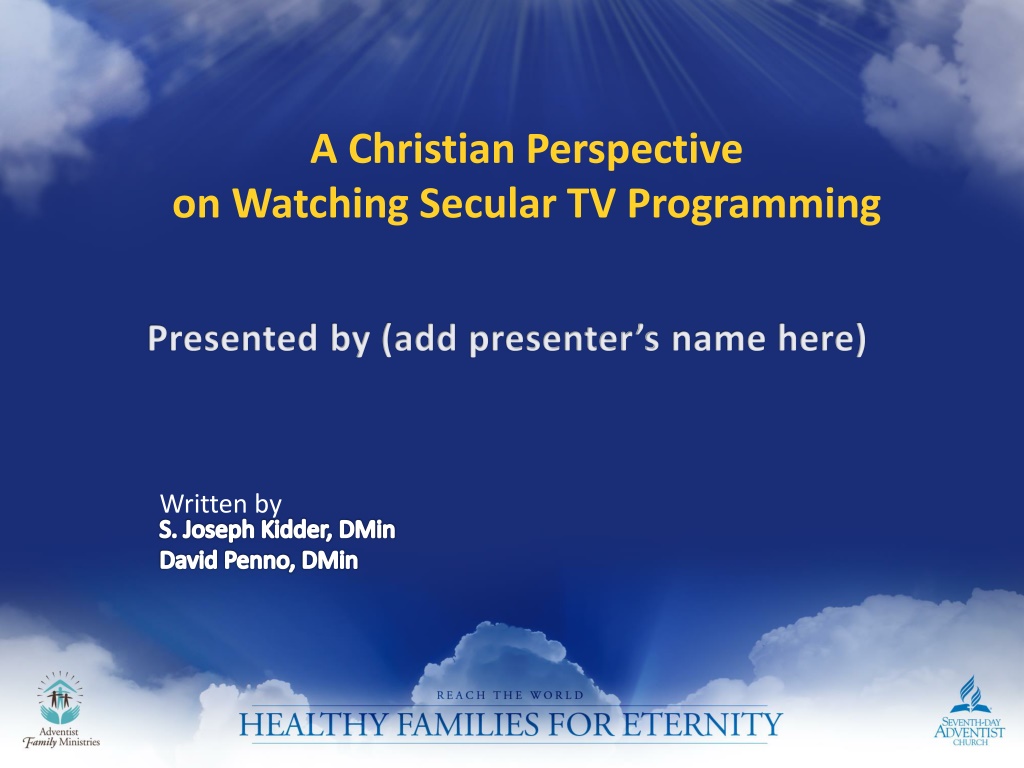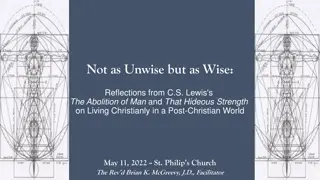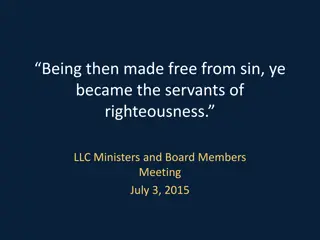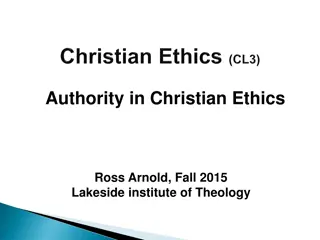Christian Perspective on Watching Secular TV
This article delves into the impact of secular TV programming on Christian viewers, exploring biblical principles, Ellen White's insights, and the influence of television on secular thought. It also discusses the scarcity of positive religious representation on TV and its potential implications.
Download Presentation

Please find below an Image/Link to download the presentation.
The content on the website is provided AS IS for your information and personal use only. It may not be sold, licensed, or shared on other websites without obtaining consent from the author.If you encounter any issues during the download, it is possible that the publisher has removed the file from their server.
You are allowed to download the files provided on this website for personal or commercial use, subject to the condition that they are used lawfully. All files are the property of their respective owners.
The content on the website is provided AS IS for your information and personal use only. It may not be sold, licensed, or shared on other websites without obtaining consent from the author.
E N D
Presentation Transcript
A Christian Perspective on Watching Secular TV Programming Presented by (add presenter s name here) Written by S. Joseph Kidder, DMin David Penno, DMin
Research on Viewing TV Programming On average, children ages 2-5 spend 32 hours a week watching TV, DVDs, videos and game consoles Kids 6-11 years spend about 28 hours a week in front of the TV 71% of 8-18 year olds have a TV in their bedroom 41% of TV viewing today is via the Internet, cell phones, iPads and tablets Research conducted by the University of Michigan Health System in 2010
Biblical Principles The Bible exhorts Christians to be careful about what enters their minds and thoughts The Christian should be guided by biblical principles in deciding which television to watch or not Finally, brothers and sisters, whatever is true, whatever is noble, whatever is right, whatever is pure, whatever is lovely, whatever is admirable-if anything is excellent or praiseworthy-think about such things. (Philippians 4:8)
Ellen White states the following God desires men and women to think soberly and candidly. They are to ascend to a higher and still higher grade, commanding a wider and still wider horizon. Looking unto Jesus they are to be changed into His Image. (Selected Messages, Vol. 1)
Television and Secular Thought God is rarely mentioned in a positive way on TV In actual life many people follow Him faithfully Many people turn to God in prayer either regularly or occasionally People of influence in the TV industry are attempting to change the worldview of viewers The majority of them do not attend any kind of church Constant TV watching can shape the Christian to think in secular ways
Television and Secular Thought A study published in 1994 concluded that the infrequent presentation of religion and spirituality on TV tends to convey the message that religion is not important because it is rarely portrayed in the lives of the people in TV programs Though this study was done a while ago, few would argue that today secular TV facilitates a visual experience from an artificial perspective
Television and the Myths of the World Television programming portrays a certain reality and a version of life contrary to the Christian way of life Television programming suggests that being wealthy good- looking or physically strong are the only ways to be successful in society Television legitimizes prejudice, dishonesty, selfishness, and glorifies perversion of sex, drugs, drinking and smoking As children watch television they become products of an image factory that tells them how to behave toward their parents and their peers
Television and God The Bible affirms that what matters in life is to know God and to walk with Him (1 John 1:6) The message of the Bible is loud and clear: once a person receives God s gift of grace and salvation, God leads believers to focus on eternal spiritual matters We must manage what we watch because it influences our thinking
Christians Management of TV Viewing Children must be taught to manage properly what they are exposed to. Television is no exception An effective way of reducing television consumption among children is to limit its use Evaluate the TV content and limit viewing time We must view TV with an active mind that responds with a Christian worldview We are responsible for what TV communicates to us
Set An Example Children learn from example. Parents must model proper TV viewing habits for their children Spend a few minutes to read about what is available and map out what may be worthy of our attention each day Parents must know how to make competent, ethical decisions based on Christian values and principles
Romans 12:1-2 Therefore, I urge you, brothers and sisters, in view of God s mercy, to offer your bodies as a living sacrifice, holy and pleasing to God this is your true and proper worship. Do not conform to the pattern of this world, but be transformed by the renewing of your mind. Then you will be able to test and approve what God s will is his good, pleasing and perfect will. S. Joseph Kidder, Dmin, is Professor of Christian Ministry at the Seventh-day Adventist Theological Seminary at Andrews University in Berrien Springs, Michigan, USA. David Penno, DMin, is Associate Professor of Christian Ministry at the Seventh-day Adventist Theological Seminary at Andrews University in Berrien Springs, Michigan, USA.





























